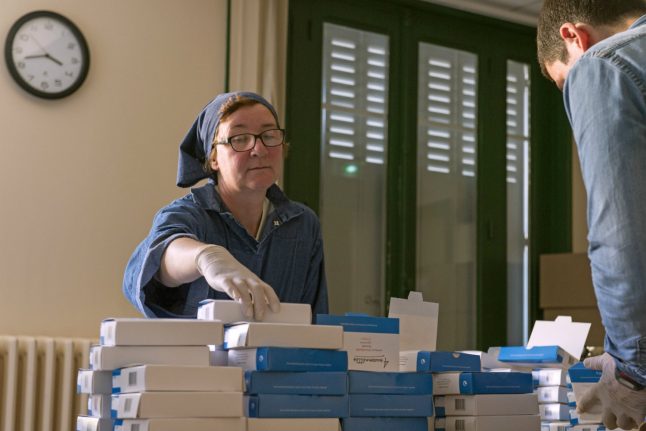The community of Benedictine sisters has been manufacturing cosmetics since 1954, after two sisters, a chemist and a mathematician, began the practice.
Body lotions, shower gels and moisturisers are among the products made in the abbey's own laboratory, where the nuns acknowledge they must now make time for prayer and business.
“A company, must develop or it dies,” said Mother Pascale, dressed in a veil and scapular while supervising production.
“We have needed to develop, to make more turnover and to modernise our clientele,” she added, sounding more business executive than spiritual leader.
For the Benedictines, manual labour is imperative to respect the rule of Saint Benedict, which dates back to the sixth century.
As long as it is not during the hours of prayer, the sisters can work on the products, from conception to packaging.
Even Sister Marie-Suzanne, at the age of 97, and dean of the abbey, is involved in the work.
But in order to meet the demand, the abbey has hired some 10 non-religious employees to help with the production.
“The purpose is not to look for money to grow rich. We are not planning to do a stock listing! But to make a living with a reasonable margin,” said Mother Pascale.
Sold in monasteries, boutique shops and on the internet — the abbey even has a Facebook page — the cosmetics are mainly created from natural products and generated one million euros ($1.2 million) in sales last year.

Nuns of the Saint-Vincent abbey and their non-religious employees attend a working meeting at the abbey in Chantelle. Photo: Thierry Zoccolan / AFP
Much of the money is used to renovate and repair the 7th century abbey's many beautiful, yet old, ramparts and monastic buildings.
“We live in beauty but the renovations are expensive. We have redone the roof, and the rooms we live in… but it never ends,” sighed the abbess.
The market for abbey-made products is far from unique to France, and is at least as developed in Germany and to a lesser extent in Britain.
Across France, some 250 to 300 communities dedicated to prayer sell products or services.
READ ALSO: Aleppo soap makes leap from flattened souk to Paris suburb
From biscuits to jam and honey, to gluten-free products and organic vegetables, men and women of the cloth have expanded into a variety of businesses.
The Abbey of St Wandrille, founded in 649, restarted the production of monastic beer last year with great success.
The community has sold more than 100,000 bottles in less than a year, more than half on site.
The Grande Chartreuse monastery, in Isere, has experienced even greater success marketing its alcohol.
It distills a liqueur, created from a mix of 130 plants, that has a natural green colour — the exact recipe only known by two of the abbey's monks.
The business now employs 58 people in its factory in Voiron and had some 17 million euros in sales in 2015.
Citeaux Abbey, in Burgundy, known for its washed rind cheese made from cow's milk, posted 1.2 million euros in sales last year.
Much of the cheese is sold on-site but also in places as far away as Dubai, Montreal and Tokyo.
“Fifteen days ago, I received a call from a company that helps businesses in difficulty,” explained Father Jean-Claude.
“I told him: Yes, I have a problem. We produce 120,000 cheeses a year, but we have demand for more than 160,000!”
To protect the image of their products and avoid unfair competition, more than 200 communities have formed an association and created the “Monastic” mark to certify the authenticity of products from monasteries.
But despite the growth of some of their businesses, some analysts argue that many monasteries lack opportunities to expand.
“The vast majority of communities have modest productions because the place of the work remains very limited,” said Marie-Catherine Paquier, author of a thesis on the purchase of monastic products.
The total market for “Made in Abbeys” products is estimated to be 75 million euros a year, she said.
If the market expands, business-minded nuns and monks may increasingly have to reconcile spirituality with potential profitability.
Mother Pascale at Chantelle recognises it could pose a problem, but insists: “The priority, is to look for the Lord”.
READ ALSO: French monks bring back ancient beer brewing tradition



 Please whitelist us to continue reading.
Please whitelist us to continue reading.